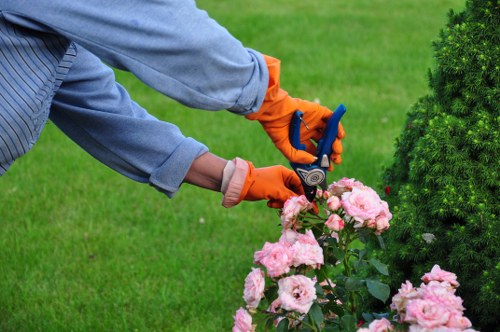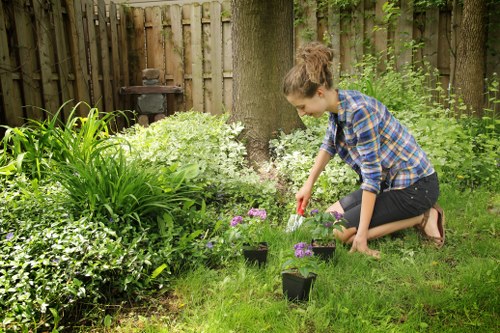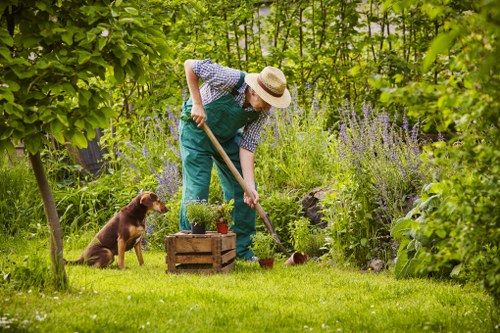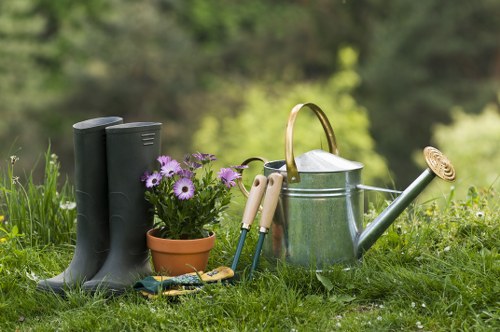Comprehensive Guide to Hedge Trimming in Merton Park

Maintaining healthy and aesthetically pleasing hedges is essential for any property in Merton Park. Whether you're a homeowner looking to enhance your garden or a professional landscaper, understanding the best practices for hedge trimming can make a significant difference.
Hedge trimming not only keeps your garden neat but also promotes the growth and health of your hedges. Proper trimming techniques can prevent diseases, improve airflow, and ensure your hedges grow in the desired shape and size.
In this guide, we will explore everything you need to know about hedge trimming in Merton Park, including tips, tools, and local considerations.
Why Hedge Trimming is Important

Hedge trimming plays a crucial role in maintaining the health and appearance of your garden. Here are some key reasons why regular trimming is essential:
- Promotes Healthy Growth: Trimming encourages new growth and keeps the hedge dense.
- Prevents Disease: Removing dead or diseased branches helps prevent the spread of infections.
- Enhances Curb Appeal: Well-maintained hedges contribute to the overall attractiveness of your property.
- Controls Size and Shape: Regular trimming keeps your hedges in check, preventing them from becoming overgrown.
Understanding the importance of hedge trimming can motivate you to maintain your garden regularly.
When to Trim Your Hedges

The timing of hedge trimming is crucial for the health and growth of your plants. In Merton Park, the best times to trim hedges are:
- Late Spring: After the first growth cycle, usually in May.
- Late Summer: To shape the hedge and prepare it for winter.
Trimming during these periods ensures that your hedges have enough time to recover and promote new growth before the next growing season.
Essential Tools for Hedge Trimming

Having the right tools is essential for effective hedge trimming. Here are the must-have tools for the job:
- Hedge Trimmers: Electric or gas-powered trimmers make the job easier and faster.
- Pruning Shears: For precise cuts and removing smaller branches.
- Loppers: Useful for thicker branches that pruning shears can't handle.
- Gloves: Protect your hands from thorns and debris.
- Safety Goggles: Shield your eyes from flying particles.
Investing in quality tools will ensure that your hedge trimming is efficient and safe.
Step-by-Step Hedge Trimming Guide

Follow these steps to achieve perfectly trimmed hedges:
- Plan Your Trimming: Decide on the shape and size you want your hedges to be.
- Prepare Your Tools: Ensure all your tools are clean and in good working condition.
- Start Trimming: Begin at the top and work your way down, maintaining an even shape.
- Remove Dead or Diseased Branches: Cut these branches to prevent the spread of disease.
- Shape the Sides: Trim the sides to ensure uniformity.
- Clean Up: Remove all clippings and debris from the area.
Following these steps can help you achieve professional-looking hedges with minimal effort.
Local Considerations in Merton Park

Merton Park has its unique climate and soil conditions that can affect hedge growth. Here are some local considerations to keep in mind:
- Climate: The temperate climate in Merton Park supports a variety of hedge plants, but it's essential to choose species that thrive in these conditions.
- Soil Type: Understanding your soil type can help you select the right hedge plants and determine their watering needs.
- Local Regulations: Be aware of any local regulations regarding hedge heights and maintenance, especially in residential areas.
Taking these factors into account ensures that your hedge trimming efforts are effective and compliant with local guidelines.
Choosing the Right Plants for Your Hedges

Selecting the appropriate plants is crucial for maintaining healthy and attractive hedges. Some popular hedge plants suitable for Merton Park include:
- Boxwood: Ideal for formal hedges due to their dense foliage.
- Privet: Fast-growing and easy to shape.
- Laurel: Provides thick coverage and is resistant to pests.
- Holly: Offers evergreen beauty with vibrant berries.
- Yew: Tolerates heavy pruning and maintains its shape well.
Choosing the right species ensures that your hedges remain healthy and visually appealing throughout the year.
Professional Hedge Trimming Services in Merton Park

While DIY hedge trimming is feasible, hiring a professional service can offer several advantages:
- Expertise: Professionals have the knowledge and experience to handle various hedge types and trimming techniques.
- Efficiency: They can complete the job faster with the right tools and manpower.
- Safety: Professionals are trained to work safely, especially when dealing with tall hedges or heavy equipment.
- Consistent Results: Ensure your hedges are trimmed uniformly and to your specifications.
Consider hiring a local hedge trimming service in Merton Park to achieve the best results for your garden.
Cost of Hedge Trimming in Merton Park

The cost of hedge trimming can vary based on several factors:
- Size of the Hedge: Larger hedges require more time and resources to trim.
- Type of Plants: Some plants may require specialized trimming techniques.
- Accessibility: Difficult-to-reach hedges may increase the cost due to the additional effort needed.
- Frequency: Regular maintenance contracts may offer better rates compared to one-time services.
On average, hedge trimming in Merton Park can range from £30 to £100 per hour, depending on the complexity and size of the job.
Maintaining Your Hedges Between Trims

Proper maintenance between trims is essential to keep your hedges healthy and looking their best:
- Regular Watering: Ensure your hedges receive adequate water, especially during dry periods.
- Fertilizing: Apply appropriate fertilizers to promote growth and strength.
- Weeding: Keep the base of the hedges free from weeds to reduce competition for nutrients.
- Pest Control: Monitor for pests and treat infestations promptly.
Consistent maintenance helps reduce the need for extensive trimming sessions and keeps your hedges in optimal condition.
Common Mistakes to Avoid
Even with the best intentions, it's easy to make mistakes while trimming hedges. Here are some common errors to avoid:
- Over-Trimming: Cutting too much can stress the plant and inhibit growth.
- Ignoring Plant Health: Failing to remove diseased branches can spread infections.
- Incorrect Timing: Trimming at the wrong time of year can negatively affect growth.
- Using the Wrong Tools: Inadequate or dull tools can damage the hedges.
- Neglecting Safety: Not using protective gear can lead to injuries.
Being aware of these common mistakes can help you achieve better results and maintain the health of your hedges.
Environmental Benefits of Well-Trimmed Hedges
Maintaining your hedges isn't just about aesthetics; it also provides several environmental benefits:
- Habitat for Wildlife: Dense hedges offer shelter and food for birds and other small animals.
- Air Quality: Hedges help filter pollutants from the air, improving overall air quality.
- Noise Reduction: Thick hedges can act as natural sound barriers, reducing noise pollution.
- Carbon Sequestration: Plants absorb carbon dioxide, helping to mitigate climate change.
Well-maintained hedges contribute positively to the environment, making your garden a greener and more sustainable space.
Innovative Techniques in Hedge Trimming
Advancements in gardening have introduced new techniques to hedge trimming that enhance efficiency and results:
- Use of Sharp Tools: Ensures clean cuts, promoting faster healing and healthier growth.
- Trimming in Phases: Dividing the trimming process into stages reduces stress on the plants.
- Incorporating Mulching: Applying mulch after trimming helps retain moisture and suppress weeds.
- Integrated Pest Management: Combines biological, physical, and chemical methods to control pests sustainably.
Adopting these innovative practices can improve the effectiveness of your hedge trimming routine.
Sustainable Hedge Trimming Practices
Sustainability in gardening is increasingly important. Here are some eco-friendly practices for hedge trimming:
- Use Manual Tools: Electric or manual tools reduce energy consumption.
- Recycle Clippings: Compost hedge trimmings to enrich your soil.
- Choose Native Plants: Native species are better adapted to local conditions and require fewer resources.
- Minimize Chemical Use: Opt for natural pest control methods to protect the ecosystem.
Implementing sustainable practices ensures that your gardening activities have a minimal environmental impact.
Local Regulations and Guidelines
When trimming hedges in Merton Park, it's important to adhere to local regulations to avoid any legal issues:
- Height Restrictions: Some areas have limits on how tall your hedges can grow.
- Noise Ordinances: Be mindful of noise levels when using power tools, especially during early morning or late evenings.
- Protected Species: Certain plants may be protected, and trimming them could be restricted.
- Neighbor Agreements: Ensure that your trimming activities do not infringe on your neighbors' properties.
Familiarizing yourself with these guidelines helps maintain harmony within the community and ensures compliance with local laws.
10-15 Closest Areas to Merton Park for Hedge Trimming Services
Merton Park is surrounded by several areas that also require hedge trimming services. Here are the nearby areas along with their unique features:
- Kenton: Just north of Merton Park, Kenton offers spacious gardens ideal for extensive hedge trimming.
- Surbiton: Known for its lush suburban landscapes, Surbiton homeowners often seek professional hedge trimming.
- Raynes Park: With a mix of residential and commercial properties, Raynes Park requires versatile hedge maintenance services.
- Norbury: This area features a variety of hedge plants, making specialized trimming services essential.
- Tooting: Urban gardens in Tooting benefit from regular hedge trimming to maintain their appearance.
- West Wimbledon: Offers expansive properties where hedge trimming can significantly enhance curb appeal.
- Trimley: A smaller area with tight-knit communities that value well-maintained hedges.
- Wimbledon Central: Balances historic gardens with modern landscaping, requiring expert hedge trimming.
- Morden: Known for its green spaces, Morden often needs hedge trimming to keep parks and gardens pristine.
- Hampton Wick: Close to Merton Park, Hampton Wick homes often have ornate hedges that need careful trimming.
- Wandle Park: Features community gardens where hedge trimming services are in high demand.
- Carshalton: Offers a range of hedge types, from traditional to contemporary, requiring diverse trimming techniques.
- Sutton: A larger area with numerous residential gardens, making hedge trimming a common service request.
- Beddington: Known for its spacious properties, Beddington homeowners value professional hedge maintenance.
- New Malden: Combines residential and commercial spaces, necessitating adaptable hedge trimming services.
These nearby areas share similar landscaping needs, making hedge trimming services in Merton Park relevant to a broader community.
Conclusion
Hedge trimming in Merton Park is more than just a garden chore; it's an investment in the health and beauty of your property. By understanding the best practices, using the right tools, and considering local factors, you can maintain stunning hedges that enhance your home's appeal and contribute to a healthier environment.
Whether you choose to tackle the task yourself or hire a professional, regular hedge trimming ensures that your garden remains an inviting and vibrant space year-round.
Frequently Asked Questions
1. How often should I trim my hedges in Merton Park?
Generally, hedges should be trimmed twice a year—once in late spring and again in late summer. However, some fast-growing species may require more frequent maintenance.
2. What is the best time of day to trim hedges?
The best time to trim hedges is in the early morning or late afternoon when temperatures are cooler. This helps prevent stress on the plants and reduces the risk of disease.
3. Can I trim hedges myself, or should I hire a professional?
While DIY trimming is possible, hiring a professional ensures precise and efficient results, especially for large or complex hedges. Professionals also have the expertise to handle various hedge types and potential issues.
4. What types of hedges are best suited for Merton Park's climate?
Plants like Boxwood, Privet, Laurel, Holly, and Yew are well-suited for Merton Park's temperate climate. These species are hardy and respond well to regular trimming.
5. How can I prevent diseases in my hedges?
Regular trimming to remove dead or diseased branches, ensuring proper airflow, and avoiding overwatering can help prevent diseases in your hedges.